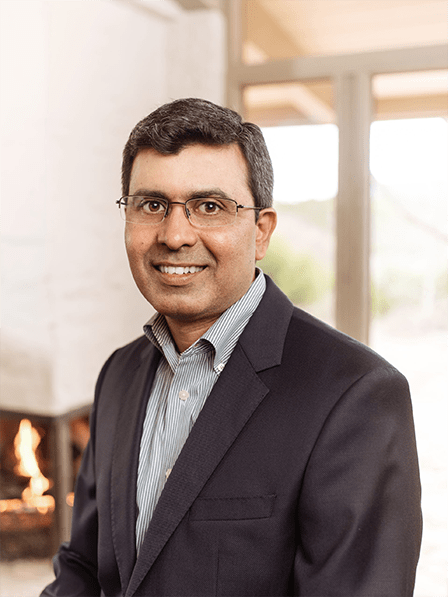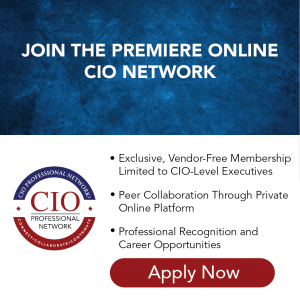
CIO
James Avery
Walk us through your CIO path. How did you decide to pursue a career in technology, and how did you progress to your current organization?
My path to a CIO was an unlikely journey. I grew up in India and was being groomed to be a successor to my dad’s industrial business. I was maybe 12 or 13 when my dad invested in a few PCs to computerize his back-office operations. That was my first exposure to computers and I casually began to learn and code DBASE during my summer breaks. This got me into coding and over the years I continued to develop and moved some of my dad’s back office to a digital format. I pursued a degree in telecommunications and eventually a Master’s in Computer Science. As part of my master’s program, I did an internship at Wipro Technologies, which was one of the largest technology firms in India at the time. This introduced me to larger suite of technologies across the spectrum from OS to databases and applications.
“Know your customer and build relationships” was an enduring principle my dad followed and had instilled in me. This has proven to be a very important factor in my career success. During my internship, I spent a lot of time with visiting customers (end-users) and interacting with them. These conversations bought to light a very important user sentiment about a major ERP project that was being implemented. They expressed inhibitions and concerns about the implementation, lack of understanding of the change and a sense of distrust that this was a corporate decision enforced on them. At the end of my 6-month internship, I had to give a presentation to a bunch of people that included the head and senior VP of the organization. I shared my learnings about the customers (end-users) – their concerns and anxiety about change and lack of engagement. I later understood that the leadership appreciated the presentation as they were very unaware of the customer sentiment. A couple of weeks later, I also got a call with an offer to join the company full time and lead this project for the division. This essentially led to rewrite of my career trajectory and put me on track to pursue a career as an IT professional.
“Know your customer and build relationships” was an enduring principle my dad followed and had instilled in me. This has proven to be a very important factor in my career success.
After a couple of years at Wipro, I moved to the United States. This was a time when a lot of companies were figuring out their Y2K impact. I worked at various clients doing Y2K assessments and I landed at AMF Bowling for one of these assessments. I eventually converted to full time and held progressively responsible roles and ultimately to the coveted CIO role over my 12 years with them, the last 6 of which was as a CIO. This was a rather rapid ascent and I attribute this to my relentless focus on customer needs and experience, and of course, the many other early lessons from my business apprenticeship. AMF was a company going through a major transition from a lackluster bowling venue to a customer focused family center. I had the incredible opportunity to have a front row seat to affect every part of the organization. My team led the technology transformation to support everything from automation of facilities, to enabling advanced analytics, and delivering exceptional customer experiences. The most remarkable part of this transformation was the scale (400+ locations across 35 states and 10K+ employees) and the time (about 5 years). As a first time CIO, my time here gave me a lifetime of experience as I had to learn and figure things out along the way given the aggressive pace and scale of change. I was also lucky to have a great peer/mentor (CHRO) who coached me and help me mature as a leader.
This was a rather rapid ascent and I attribute this to my relentless focus on customer needs and experience, and of course, the many other early lessons from my business apprenticeship.
Tell us about your company. Speak to the industry, size of the company, and the services provided to your customers.
James Avery Artisan Jewelry is a vertically integrated, family owned company located on the out skirts of San Antonio in the heart of the Texas Hill Country. The company was founded 65 years ago and offer finely crafted jewelry designs for men and women in sterling silver, 14K and 18K gold, gemstones and leather handbags. James Avery jewelry is designed by skilled artisans in Kerrville, Texas. I joined James Avery Jewelry 8 years ago. At the time, the company had about 45 stores and had a great growth plan. Today, we have more than doubled in size with about 96 company owned stores. Our Jewelry is also available in more than 220 Dillard’s stores in Texas and in 28 additional states, airport stores in Austin and Houston, Army and Air Force Exchange Service locations at Fort Hood and Fort Belvoir and nationwide through JamesAvery.com.
What are your top 3 – 5 (ongoing) main priorities as a CIO in your organization?
Everything we do at James Avery is focused on customer outcomes and experiences. Our vertically integrated business offers new and exciting challenges in how we leverage technology; whether it’s improving efficiencies in our manufacturing operations, driving order accuracy in our Distribution center, ensuring seamless transactions in our Retail stores or providing immersive experience on our website, our technology team is an integral part of our business.
On this continuum, we are currently focused on factory automation with manufacturing execution system (MES) to improve cycle time. This also connects our digital ecosystem all the way from sales to manufacturing. When completed, the shop floor will have real time understanding of demand and likewise, the stores will have full visibility of WIP. We are also continually looking at opportunities to improve customer experiences. We are working on an AI based customer intelligence platform for optimized marketing and personalized engagement and finally we are making great strides in developing a unified data analytics platform for analytics at scale.
To support these and other business strategies, we are executing a multi-cloud infrastructure strategy (year 2 of 3). Of course, Security is always top of mind, and we are also adopting Dev/Ops automation to our traditional application development as well.
How do you decompress from your role as a technology executive? What do you do for fun?
I’m nerdy when it comes to off work. I love to read, and I particularly enjoy reading about human history, culture and traditions. I spend time exploring these topics and travel to places with rich culture and history. I enjoy outdoors and my wife and I often go on nature walks/hikes. We became empty nesters this year and I guess we are redefining what is “fun” for us.
Can you list your top 1-3 books that you would recommend for a technology leader to have on their bookshelf/Kindle?
The 2 books that have inspired and influenced me the most are:
- Courage by Gus Lee – In his book Courage, Gus presents the principles that differentiate a “good” leader to a “courageous” leader. There are several examples and case studies presented and this has served as a good guide for me.
- Start with Why by Simon Senek – In Start with Why, Simon emphasizes the need to be purpose driven and have clarity on the “why” we do something and how we can inspire and motivate our teams.
The most recent book I read over summer is Sapiens by Yuval Noah Harari, not necessarily a leadership book but a great read to understand Humankind.
Can you share a specific quote that is a source of inspiration for you as a leader?
This may seem predictable – but I have this quote stuck on my screen.
“There are three essentials to leadership: humility, clarity and courage.”
Fuchan Yuan, Chan Master
The one quote that’s truly inspired me introspect is from the autobiography of Nelson Mandela – Long Walk to Freedom.
“As I walked out the door toward the gate that would lead to my freedom, I knew if I didn’t leave my bitterness and hatred behind, I’d still be in prison”.
Nelson Mandela, Long Walk to Freedom
This was Mandela’s response when a reporter asks him if he was angry after being imprisoned for 27 years.
Please share a recommendation or testimonial on the benefit that you see as a member of this CIO Professional Network?
The CIO professional network is a one of a kind forum for CIOs by CIOs. In the few months of its existence, it has already proven to be a great platform for robust peer connections, rich content, and meaningful insights all generated and informed by a seasoned group of IT leaders nationwide. I particularly like the niche subgroups available for a more intimate dialogue with a smaller subset of people based on a specific vertical, Industry, or marketplace.







